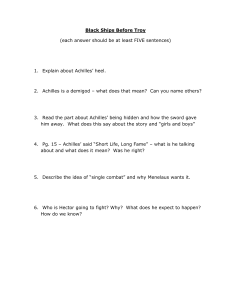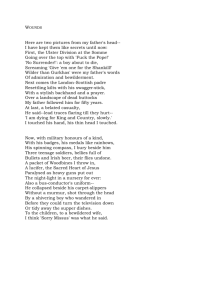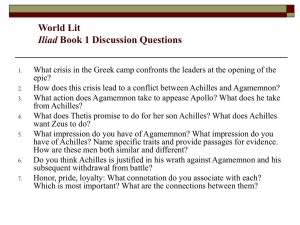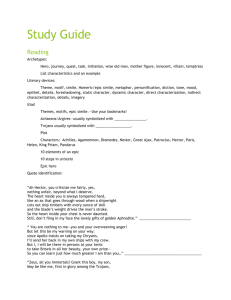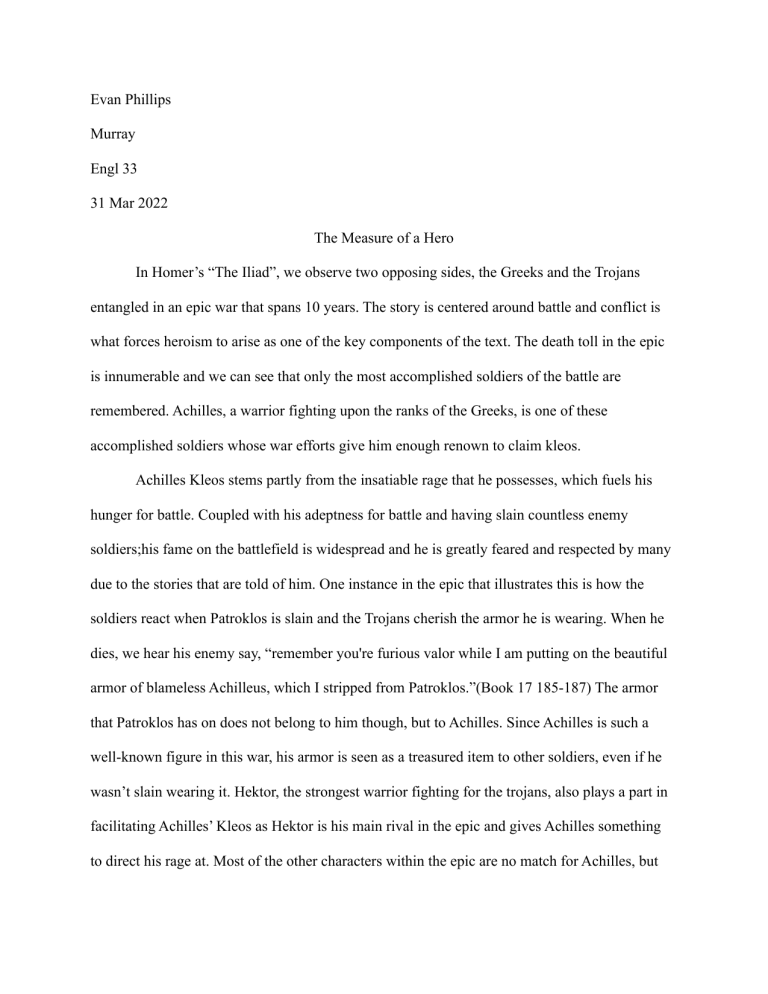
Evan Phillips Murray Engl 33 31 Mar 2022 The Measure of a Hero In Homer’s “The Iliad”, we observe two opposing sides, the Greeks and the Trojans entangled in an epic war that spans 10 years. The story is centered around battle and conflict is what forces heroism to arise as one of the key components of the text. The death toll in the epic is innumerable and we can see that only the most accomplished soldiers of the battle are remembered. Achilles, a warrior fighting upon the ranks of the Greeks, is one of these accomplished soldiers whose war efforts give him enough renown to claim kleos. Achilles Kleos stems partly from the insatiable rage that he possesses, which fuels his hunger for battle. Coupled with his adeptness for battle and having slain countless enemy soldiers;his fame on the battlefield is widespread and he is greatly feared and respected by many due to the stories that are told of him. One instance in the epic that illustrates this is how the soldiers react when Patroklos is slain and the Trojans cherish the armor he is wearing. When he dies, we hear his enemy say, “remember you're furious valor while I am putting on the beautiful armor of blameless Achilleus, which I stripped from Patroklos.”(Book 17 185-187) The armor that Patroklos has on does not belong to him though, but to Achilles. Since Achilles is such a well-known figure in this war, his armor is seen as a treasured item to other soldiers, even if he wasn’t slain wearing it. Hektor, the strongest warrior fighting for the trojans, also plays a part in facilitating Achilles’ Kleos as Hektor is his main rival in the epic and gives Achilles something to direct his rage at. Most of the other characters within the epic are no match for Achilles, but Hektor is able to challenge him and the glorious war efforts that Achilles makes in an attempt to take down Hektor and the Trojans are what help his Kleos develop. While Achilles Kleos is demonstrated clearly through the way he is viewed by his peers and enemies alike, it is also tested as his actions go against the person he is supposed to be. Achilles sits out of the war for a large portion of it due to a quarrel between himself and Agamemnon, the leader of the Greek army. In their argument we hear Achilles speak, “Now I am returning home to Pithia, since it is much better to go home again with my curved ships, and I am minded no longer to stay here dishonoured and pile up your wealth and luxury.”(Book 1 169-171) Here we see Achilles, this legendary warrior, leaving the action and returning home. This act troubles his claim to Kleos but does not completely negate it as here we see Achilles struggling internally with his own sense of honor. His personal sense of honor and pride that he has for himself, clashes with his own morals of what he must do as a warrior due to the fact that he wants to be a part of the fight, but has declared he will not rejoin until Agamemnon agrees to make amends. His kleos is further solidified through when he returns to the actions and eventually takes the life of Hektor. We see how Achilles’ return sways the war in favor of the Greeks, so much so that the gods must even intervene at times to stop Achilles’ from destroying Troy before the time they have prophesied. In “The Iliad” by Homer, the intense war that is occurring allows Homer to portray kleos in the characters of the story. Achilleus is one character whose kleos can be observed through the legacy that we see he has built up to this point. His efforts in war , the rage that he presents on the battlefield, and having an adversary to direct this rage at are what allow him to hold this title.
